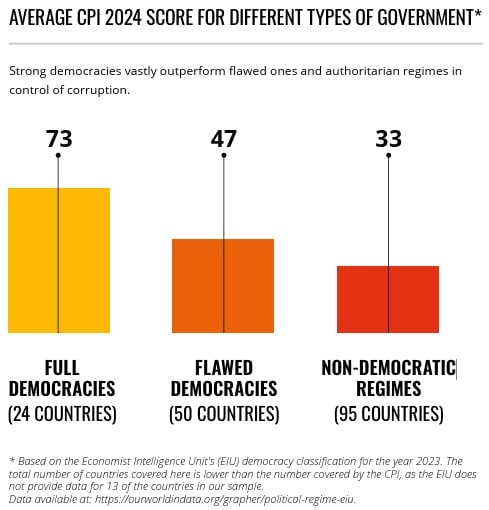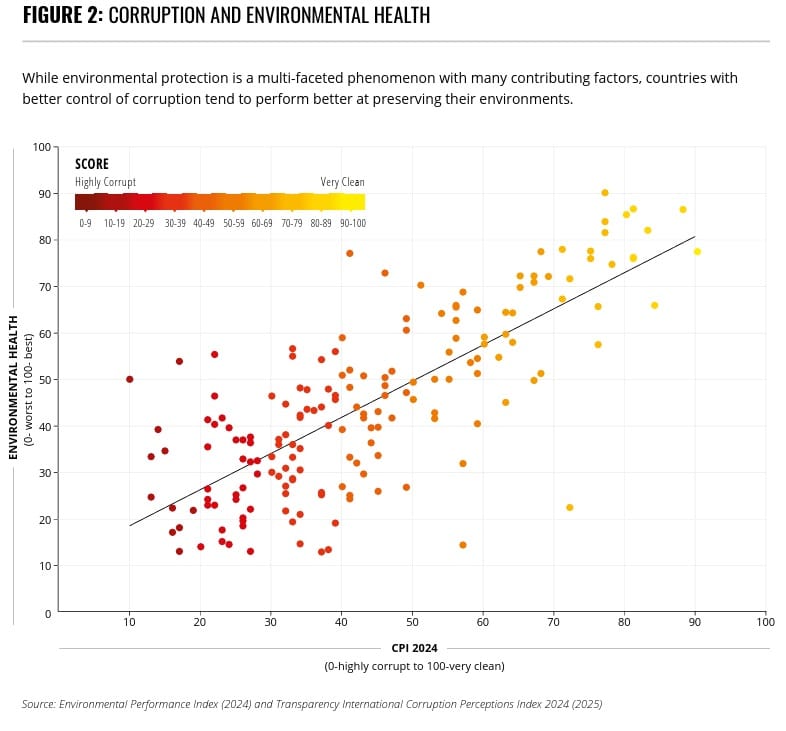Stockholm (NordSIP) – The 2024 Corruption Perceptions Index, published by Transparency International, continues to paint a bleak picture of the state of the world. According to the report, global corruption remains largely unchanged, with the average score constant at 43 out of 100, a level that has held steady for years. This average reflects the fact that two-thirds of the 180 countries assessed scored below 50, a signal of governance where corruption is a serious problem.
The report notes that between 2012 and 2024 the defining trend was stability with the scores of 101 countries staying the same. As for the rest, 32 countries improved their score in this period, while 47 countries declined. In 2024, the Nordics continued to lead although the report did highlight vulnerabilities in Sweden and Norway. Beyond the Nordics, Singapore, New Zealand, Luxembourg, Switzerland, the Netherlands and Australia also ranked in the top 10 least corrupt countries in the world according to the report. South Sudan, Somalia, Venezuela, Syria, Equatorial Guinea, Libya, Eritrea, and Yemen rank among the lowest-scoring, most corrupt nations.
Authoritarian Backsliding and Climate Change Corruption
Using the Economist Intelligence Unit’s (EIU) measure of democratic development, Transparency International also notes the relationship between institutions and corruption, highlighting that CPI increases as democratic standards improve: full democracies average a CPI score of 73, while flawed democracies lag at 47, and non-democratic regimes score a mere 33. This divergence underscores the role of robust institutions, transparency, and civic institutions in curbing corruption.
“Corruption is an evolving global threat that does far more than undermine development – it is a key cause of declining democracy, instability and human rights violations. The international community and every nation must make tackling corruption a top and long-term priority. This is crucial to pushing back against authoritarianism and securing a peaceful, free and sustainable world. The dangerous trends revealed in this year’s Corruption Perceptions Index highlight the need to follow through with concrete action now to address global corruption,” says Transparency International’s Chair, François Valérian.

The report also draws attention to the crippling interplay between corruption and the climate crisis. Pervasive corruption weakens governance structures and diverts climate finance intended to reduce emissions and build resilience. Corruption can also compromise transparency in environmental decision-making, which leads to unfair outcomes and the destruction of natural resources. Beyond the strong correlation between CPI and the Environmental Performance Index (EPI), the report highlights FirstEnergy’s alleged US$60 million bribery case in Ohio, USA, as well as a systematic review of climate change effects on vulnerable populations in the Global South to underscore this point.

“We must urgently root out corruption before it fully derails meaningful climate action. Governments and multilateral organisations must embed anti-corruption measures into climate efforts to safeguard finance, rebuild trust, and maximise impact. Today, corrupt forces not only shape but often dictate policies and dismantle checks and balances – silencing journalists, activists, and anyone fighting for equality and sustainability. True climate resilience demands tackling these threats directly and decisively. Vulnerable people around the world desperately need this action,” says Maíra Martini, CEO of Transparency International.
Nordic Leaders With Some Vulnerabilities?
The Nordic countries continue to uphold their good governance reputations. Denmark and Finland remained the two top countries in the world for the fourth consecutive year, while Norway and Sweden ranked in fifth and 8th place, respectively. However, it should be noted that no country is perfect and even the top two countries still have work to do. The Council of Europe Group of States against Corruption (GRECO) reports on Denmark and Finland highlighted the fact that both countries still have not implemented many of its recommendations to fight corruption.
Norway scored 81 out of 100, ranking in 5th place globally, reflecting strong institutions, albeit with isolated vulnerabilities, particularly in areas like municipal procurement and planning, where corruption can persist. Sweden achieved a score of 80 and ranked 8th worldwide, the lowest in the Nordics and its lowest result in the last 12 years. Transparency International’s dedicated analysis of Sweden pointed to public procurement, conflicts of interest and the role of organised crime in increasing corruption in Sweden, while warning that the country’s action plan lacks clear proposals to fight corruption. At the end of 2024, the OECD Working Group on Bribery warned that “Sweden’s framework for corporate liability remains fundamentally non-compliant with the Convention’s requirements, despite some legislative changes.”




